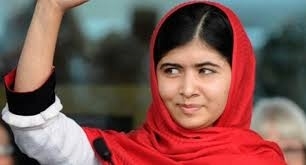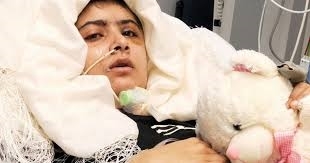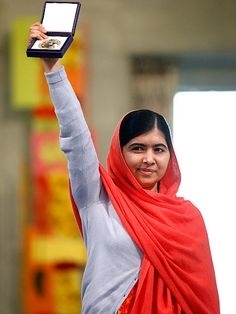 |
| (http://www.theguardian.com/commentisfree/2013/oct/ ()) |
 |
| (http://www.shughal.com/10-reasons-malala-yousafzai ()) |
 |
| (https://www.pinterest.com/mawrahocane6767/pakistan ()) |
Works Cited
Jacobs, Brian Jones and Harrison. "That Time 16-year-old Malala Yousafzai Left Jon Stewart
Speechless with a Comment about Pacifism." Business Insider. Business Insider, Inc, 18
June 2015. Web. 30 Apr. 2016.
<http://www.businessinsider.com/that-time-malala-yousafzai-left-jon-stewart-speechless-2015-6>.
"Malala Yousafzai." Bio.com. A&E Networks Television, 2016. Web. 29 Apr. 2016.
<http://www.biography.com/people/malala-yousafzai-21362253>.
"Malala Yousafzai Challenges Taliban on Education and Women's Rights in Pakistan, October 9,
2012." Historic World Events. Detroit: Gale, 2015. Student Resources in Context. Web. 28 Apr. 2016.
"Malala Yousafzai." Contemporary Authors Online. Detroit: Gale, 2015. Biography in Context.
Web. 27 Apr. 2016.
"Malala Yousafzai." Gale Biography in Context. Detroit: Gale, 2012. Biography in Context.
Web. 2 May 2016.
"Malala Yousafzai." Newsmakers. Vol. 3. Detroit: Gale, 2013. Research in Context. Web. 27
Apr. 2016.
"They thought that the bullets would silence us, but they failed." Phi Delta Kappan 95.2 (2013):
6.Biography in Context. Web. 2 May 2016.
Yousafzai, Malala, and Christina Lamb. I Am Malala: The Girl Who Stood up for Education and
Was Shot by the Taliban. New York: Machete Book Group, 2013. Print.
Yousafzai, Malala. "God has given me this new life, a second life." The Christian Century 130.5
(2013): 9. Biography in Context. Web. 2 May 2016.
Page created on 5/19/2016 12:00:00 AM
Last edited 5/19/2016 12:00:00 AM
